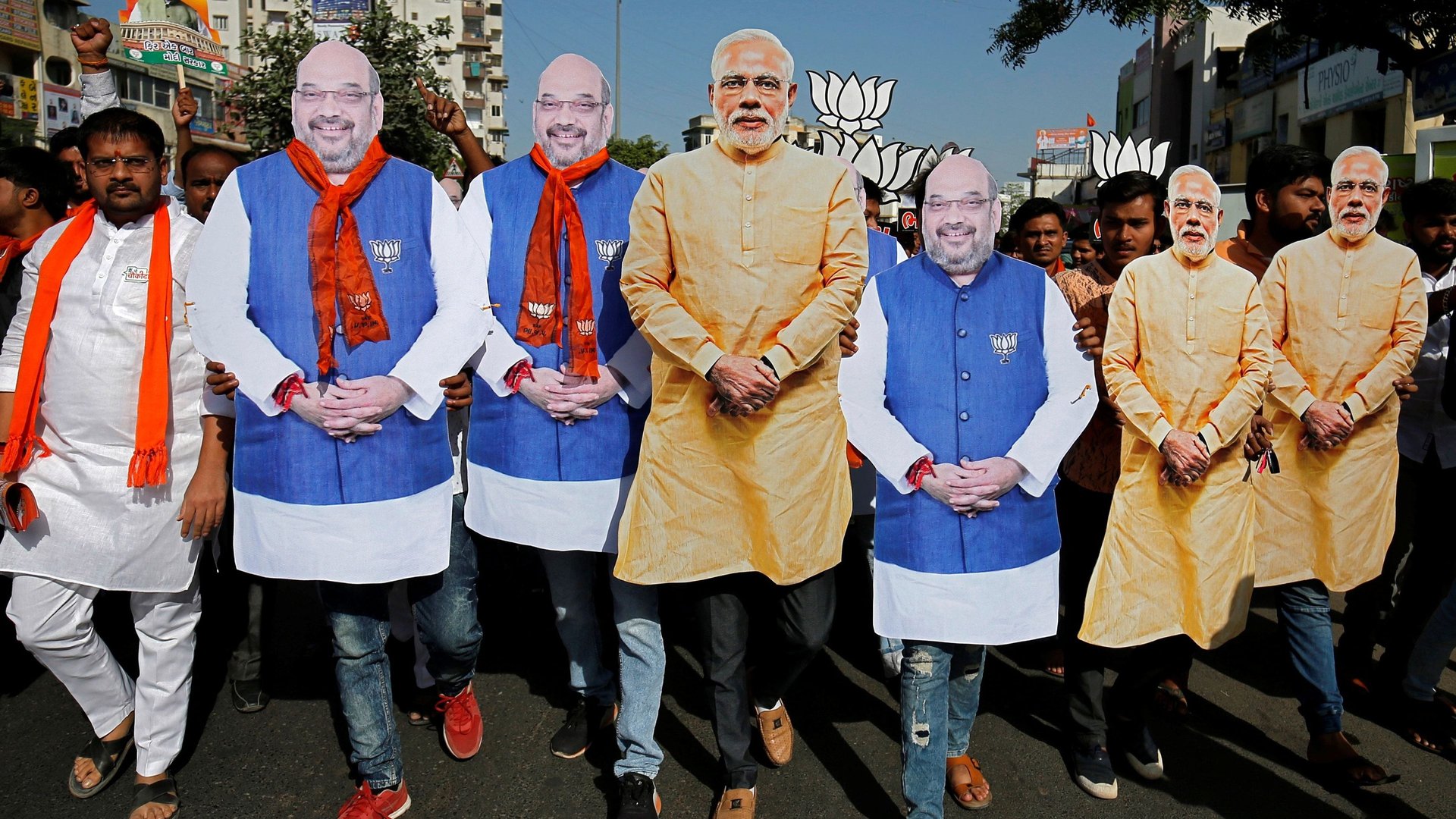The BJP’s threat to restrict Indian citizenship unmasks the ugliest side of nationalism
India’s mammoth general election officially kicked off and immediately brought a long-simmering issue to the fore: virulent religious majoritarianism.


India’s mammoth general election officially kicked off and immediately brought a long-simmering issue to the fore: virulent religious majoritarianism.
Prime minister Narendra Modi’s Bharatiya Janata Party (BJP), through its president and closest Modi aide Amit Shah, has promised the adoption of a National Registry of Citizens (NRC), a potentially incendiary move, across the country.
The NRC, a repository of names and documentation of the country’s legal citizens currently employed in the country’s northeast, counts as citizens only people who can prove that they were residents of India before March 24, 1971, as well as their descendants. Those who aren’t able to prove their status are to be deemed unauthorized immigrants—even though they might have been living in the country for generations.
Population movements—particularly of Muslims—between India, Pakistan, and Bangladesh have been common for decades. Muslim migrants who have grown roots in India long before the 1971 NRC cutoff date—which marks Pakistan’s dismemberment and the birth of Bangladesh—may lack the documentation to prove citizenship. This could be due to the poor state of record-keeping in India, or a lack of resources to obtain them.
Decoding an anti-Muslim move
Shah is suggesting that people without documentation be expelled from India, on the basis of their religion: India, though constitutionally a secular state, is Hindu in character, the BJP assumes, so Hindus (and their close relatives Sikhs and Buddhists) have a right to be in it. Muslims, not quite. Shah’s NRC promise is, effectively, code for Muslim persecution. Though he technically speaks about unauthorized immigrants, his true target are Muslims. The country’s large Christian population, the other minority technically affected by NRC rules, is hardly made up of immigrants.
A similar premise led to the genocide against the Rohingya in nearby Myanmar. In India’s northeastern state of Assam, where the register is already active, even the non-immigrant Muslim population faces displacement because of it. Around four million residents were deemed unauthorized immigrants overnight last July, among them an Indian Army veteran.
Now, if the NRC is extended to the entire country, as Shah and BJP threaten, the registry would spark uncertainty among the 180 million Muslims who represent more than 13% of the population. It could turn India, already seeing heightened religious friction under the Modi government, into a tinderbox.
Muslims and the BJP
This is hardly new. Shah has been openly making this kind of threat throughout the BJP’s rule, making up with intolerance for what his party has failed to deliver in economic and job growth.
“#NaMoforNewIndia,” reads the hashtag appended to the BJP’s tweet, which leaves little doubt to what kind of “new India” the party is pushing for—one where non-Hindus are not welcome. It is in perfect alignment with the BJP’s philosophical DNA: One of its venerated ideological fountainheads had, in the early 20th century, sought second-class status for non-Hindus while another even approved of rape as a political tool.
The BJP is in line, too, with rising nationalism around the world, which is also makes immigrants, undocumented or otherwise, scapegoats. Shah calls them “infiltrators,” Italy’s Matteo Salvini (link in Italian) deems them “invaders,” Donald Trump has declared that migrants seeking to cross the US southern border include many gang members who are “animals” who then “infest” the US.
Unlike its counterparts in other democracies, the BJP has been increasingly transparent in its messaging. It is openly saying it’s just one kind of undocumented immigrant, the Muslim, it wants to get rid of. Similarly, though he might not say it in so many words, when Trump speaks of the necessity to curb illegal immigration, it’s not westerners overstaying tourist visas he wants to keep out, and it’s not white immigrants he targets—it’s Muslims, asylum seekers from Central America, and Mexicans. Salvini, too, might try and build a public enemy in the refugees crossing the Mediterranean—but his and his party’s racist comments (link in Italian) show the issue of their illegality is secondary to their origin. In all of these cases, it is easy to see a potential progression that starts with undocumented immigrants, gets to documented ones, and then to native minorities.
With the election of Modi in 2014, India ushered in the global wave of nationalism and rightwing populism that followed. Five years later, it seems to be at the forefront again, as the first of the big democracies flirting with authoritarianism. Its nationalist party is dare saying what its obsession with illegal immigration really is about: not economic growth or job losses but ethnic, religious, and racial intolerance.
Read Quartz’s coverage of the 2019 Indian general election here.